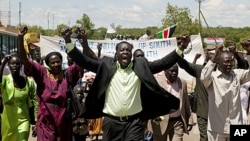South Sudan is accusing the Khartoum government of waging a campaign to depopulate southerners from the contested Abyei region and replace them with nomads loyal to the north. Control of the oil-producing area is at the heart of a bitter argument as Africa’s largest country prepares to divide into two in early July.
Abyei remains under siege four days after Sudanese government troops and allied militias bombed and shelled the town, forcing a mass exodus. United Nations peacekeepers holed up in a compound reported the deserted town was being looted and burned.
The south's dominant party, the Sudan People’s Liberation Movement (SPLM), has charged Khartoum with deliberately driving out southerners from Abyei to make way for nomadic Misseriya tribes that fought for the north during Sudan’s civil war. SPLM official Antipas Nyok told reporters the government is moving in Misseriya families to serve as a bargaining chip in future talks on whether Abyei goes north or south.
"Now they are transporting people from over 1,000 miles [1,600 kilometers], transporting them to Abyei, the Arab Misseriya, under pretext that these people will come and occupy the houses which they have chased people of Abyei away, so later on these people will claim the ownership of Abyei area," said Nyok.
Word that Misseriya are moving into the deserted town comes as the U.N. Security Council wraps up a three-day visit to Sudan to look at restructuring U.N. peacekeeping missions after partition. The fighting forced cancellation of the Council’s scheduled visit to Abyei.
British U.N. Ambassador Mark Lyall Grant said the northern government’s seizure of the town must not be allowed to stand.
"There are looting and burning now of the town, particularly by some of the Misseriya and other militias, and we have made it very clear that it is the responsibility of the Sudanese government to get their forces and their militias under control and to withdraw from Abyei town to allow some sort of independent security presence to be re-established there," Grant said.
Ambassador Lyall Grant said decisions on how to design a successor to the U.N. Mission in Sudan, UNMIS will depend on how events play out in the next few weeks.
"Part of the reason for coming at this time is that we want to be in a position before 9 July to decide what the U.N. presence should be," added Grant. "There is an UNMIS, which is a north-south presence. The question is, do you continue that for several months while the north-south issues are resolved, or do you split it into to two, and have a border force, and then you have a new U.N. mission purely for the south."
Sudanese officials this week suggested they might not accept the continued presence of U.N. peacekeepers after the UNMIS mandate expires July 9. But Ambassador Lyall Grant expressed confidence that skilled diplomacy would be able to bridge what he called “the very wide differences” between Khartoum and Juba on Abyei and other outstanding issues.
The mediation is being led by former South African President Thabo Mbeki, head of the African Union High Level Panel on Sudan, along with U.N. Special Representative Haile Menkerios.
The Khartoum government suffered a setback Tuesday with word that a minister has resigned, saying war crimes had been committed in the Abyei region. Minister Luka Biong Deng, a southerner from Abyei, said in a resignation statement that he could no longer work in a national unity government with President Omar al-Bashir’s ruling National Congress Party.
Pressure on Khartoum is also mounting from Washington. U.S. Special Envoy to Sudan Princeton Lyman said Monday the seizure of Abyei could jeopardize plans to normalize U.S.-Sudan relations, and for billions of dollars in debt relief.
South Sudan Accuses Khartoum of Depopulation Campaign in Abyei




